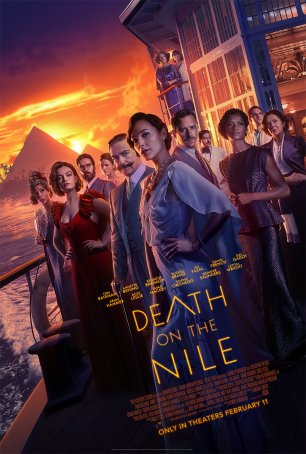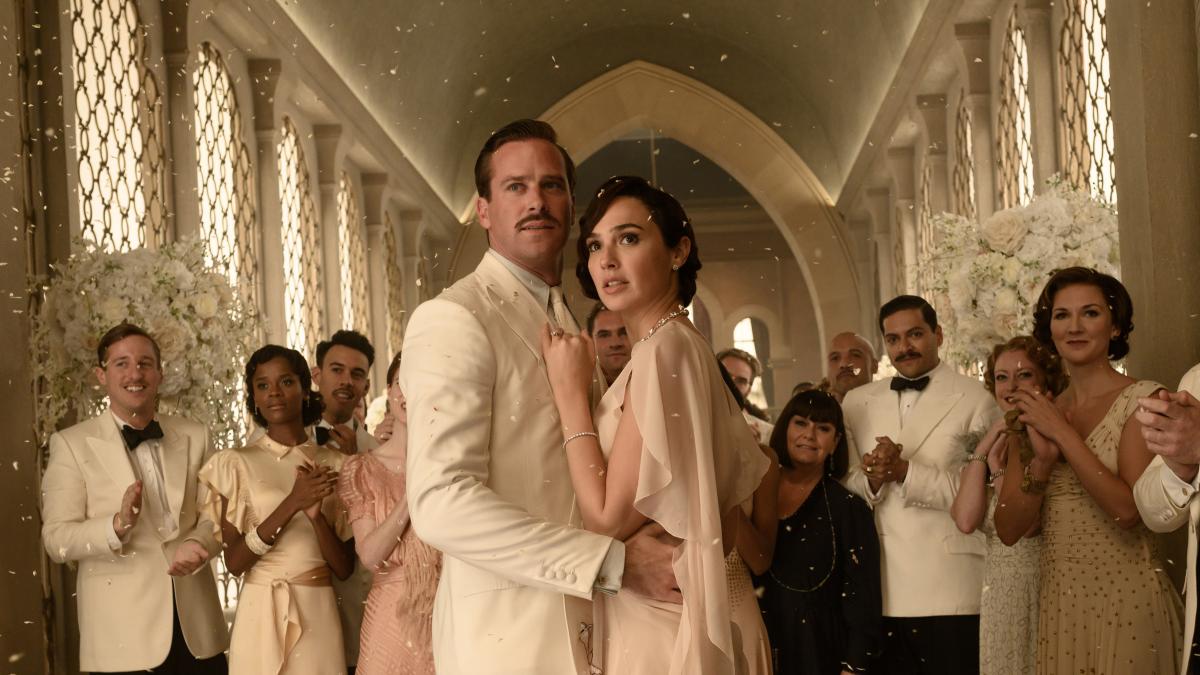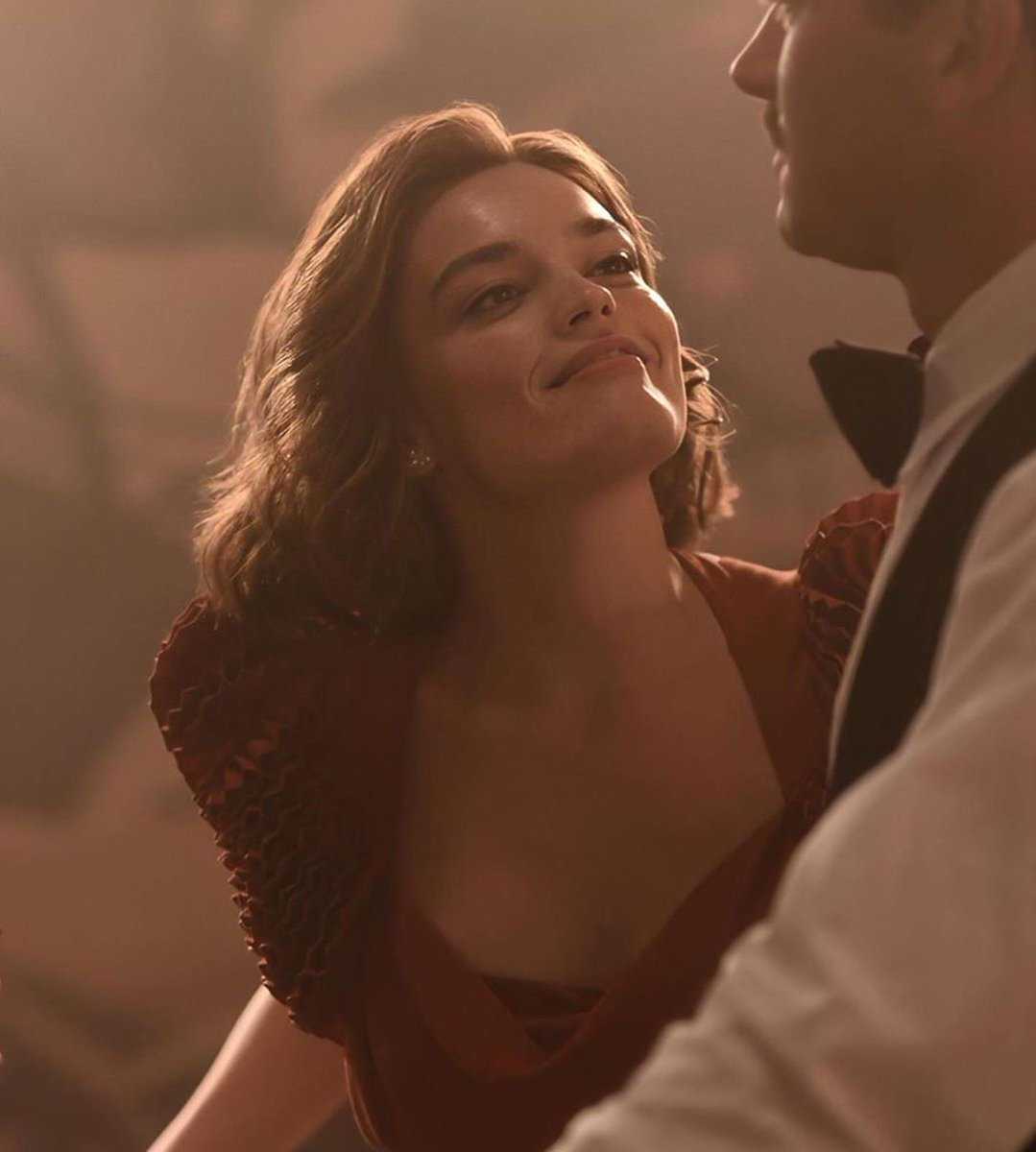Death on the Nile (USA/UK, 2022)
February 10, 2022
It has been noted that the film’s publicists are in a difficult position when it comes to marketing Kenneth Branagh’s second outing as famed detective Hercule Poirot, Death on the Nile. Since the pre-pandemic production completed filming, no fewer than four of the main cast members have suffered dramatic damage to their reputations: Gal Gadot (controversial pro-Israel comments), Armie Hammer (rape allegations), Letitia Wright (anti-vaxxer), and Russell Brand (anti-vaxxer). In terms of what actually appears on the screen, however, the public missteps are irrelevant. Death on the Nile is a well-mounted mystery/thriller and all four of those cast members do credible jobs.
Poirot and Miss Marple are Agatha Christie’s best-known characters. She first wrote about Poirot in 1920 and continued chronicling his detective adventures for more than a half-century. Poirot’s best-known tales were written during the 1930s and 1940s. Death on the Nile, which many critics have cited as Christie’s best novel, arrived in bookstores in 1937, the year in which the movie is set. Kenneth Branagh chose to film Murder on the Orient Express first since it was the more recognizable title but Death on the Nile is a meatier meal both for Christie fans and those who don’t know who she is.
 Michael Green’s adaptation follows the source material
closely in a broad sense but takes a number of liberties with the details. Various
characters have been eliminated or combined and several new ones have been
created out of whole cloth. The biggest participants in the central crime – Linnet
Doyle (Gal Gadot), Simon Doyle (Armie Hammer), and Jacqueline de Bellefort
(Emma Mackey) – are consistent with the way Christie wrote them. One significant
change has been the expansion of Poirot’s (Branagh) character. Christie didn’t
always have the kindest opinion of her detective protagonist, at one time
calling him “insufferable” and on another occasion unloading on him as a “detestable,
bombastic, tiresome, ego-centric little creep.” (Not unlike an assessment
directed at him by a character in this film.) The movie attempts, with some
success, to humanize him, creating a prologue, an epilogue, and several
passages of dialogue that address his loneliness and possible regrets. The
character of Bouc (Tom Bateman) gives him a male friend and Salome Otterbourne
(Sophie Okonedo) offers a love interest of sorts.
Michael Green’s adaptation follows the source material
closely in a broad sense but takes a number of liberties with the details. Various
characters have been eliminated or combined and several new ones have been
created out of whole cloth. The biggest participants in the central crime – Linnet
Doyle (Gal Gadot), Simon Doyle (Armie Hammer), and Jacqueline de Bellefort
(Emma Mackey) – are consistent with the way Christie wrote them. One significant
change has been the expansion of Poirot’s (Branagh) character. Christie didn’t
always have the kindest opinion of her detective protagonist, at one time
calling him “insufferable” and on another occasion unloading on him as a “detestable,
bombastic, tiresome, ego-centric little creep.” (Not unlike an assessment
directed at him by a character in this film.) The movie attempts, with some
success, to humanize him, creating a prologue, an epilogue, and several
passages of dialogue that address his loneliness and possible regrets. The
character of Bouc (Tom Bateman) gives him a male friend and Salome Otterbourne
(Sophie Okonedo) offers a love interest of sorts.
Death on the Nile mostly transpires on board the Karnak, a steamer touring the Nile as the honeymoon cruise for wealthy socialite Linnet Doyle and her new husband, Simon. Also on board, along with a variety of eventual suspects and/or victims, is Simon’s ex-fiancée, Jacqueline de Bellefort, who carries a .22 and openly talks about using it. Linnet and Simon try to engage Poirot to deter Jacqueline from following them but he counters that unless she does something illegal (which she hasn’t), he is powerless to act against her. As the cruise continues, it becomes evident that someone wants Linnet dead but it’s not certain whether that person is Jacqueline or whether one of the other nine passengers is hiding a motive. It’s up to Poirot to make the determination before the body count starts to mount.
 For a while, Death on the Nile struggles to find its
footing. The first 45 minutes are a bit of a slog as a dozen characters are
introduced, the potential victims are assembled, and various entanglements come
into the open. In addition to that, the screenplay attempts to develop Poirot
into more than the detached investigator who eventually solves the crime.
Things start to click, however, with the first attempt on Linnet’s life. After
that, the tone shifts from a Depression-era melodrama to a more traditional
Christie whodunnit? Even when one considers that constraints represented by the
law of character conservation (which deems that the murderer or murderers must
be among the significant players), the ending works.
For a while, Death on the Nile struggles to find its
footing. The first 45 minutes are a bit of a slog as a dozen characters are
introduced, the potential victims are assembled, and various entanglements come
into the open. In addition to that, the screenplay attempts to develop Poirot
into more than the detached investigator who eventually solves the crime.
Things start to click, however, with the first attempt on Linnet’s life. After
that, the tone shifts from a Depression-era melodrama to a more traditional
Christie whodunnit? Even when one considers that constraints represented by the
law of character conservation (which deems that the murderer or murderers must
be among the significant players), the ending works.
As was the case with Murder on the Orient Express, the visuals are striking. Working with cinematographer Haris Zambarloukos (who also lensed Orient Express) and again using a 65mm camera, Branagh paints a canvas to impress David Lean, with long, lingering looks at the ship in the Nile and breathtaking shots of the rock-cut temples of Abu Simbel. There are also numerous unbroken takes, including one in a WWI trench (during the prologue) that recalls Sam Mendes’ 1917. Patrick Doyle contributes a slightly bombastic score (as is typical of him) that complements the visuals more often than not.
 With one outing as Poirot behind him, Branagh seems more
comfortable in the role this time around. Whether this is his final turn as the
detective or whether the filmmaker has it in mind to try another Christie adaptation
remains to seen. Although he will never eclipse David Suchet as the definitive
Poirot, he’s at least as good as Peter Ustinov and another adventure or two
could allow him to make a deep and lasting mark as the detective.
With one outing as Poirot behind him, Branagh seems more
comfortable in the role this time around. Whether this is his final turn as the
detective or whether the filmmaker has it in mind to try another Christie adaptation
remains to seen. Although he will never eclipse David Suchet as the definitive
Poirot, he’s at least as good as Peter Ustinov and another adventure or two
could allow him to make a deep and lasting mark as the detective.
As for this movie, Branagh is strong at the center and Poirot is more involved than in the text. Die-hard Christie purists may be disappointed by some of the changes but, on the whole, Death on the Nile is faithful enough to tell the story and different enough to work better with modern-day concerns about diversity than the original text. Whodunnits? are generally an awkward fit for the two-hour limitations of a theatrical movie but this is one of the better ones.
Death on the Nile (USA/UK, 2022)
Cast: Kenneth Branagh, Dawn French, Jennifer Saunders, Ali Fazal, Rose Leslie, Sophie Okonedo, Letitia Wright, Annette Bening, Emma Mackey, Tom Bateman, Armie Hammer, Gal Gadot, Russell Brand
Home Release Date: 2022-04-05
Screenplay: Michael Green, based on the novel by Agatha Christie
Cinematography: Haris Zambarloukos
Music: Patrick Doyle
U.S. Distributor: 20th Century Studios
U.S. Release Date: 2022-02-11
MPAA Rating: "PG-13" (Violence)
Genre: Mystery/Thriller
Subtitles: none
Theatrical Aspect Ratio: 2.35:1
- (There are no more better movies of this genre)
- Coraline (2009)
- (There are no more better movies of Dawn French)
- (There are no more worst movies of Dawn French)
- Minions (2015)
- (There are no more worst movies of Jennifer Saunders)

Comments